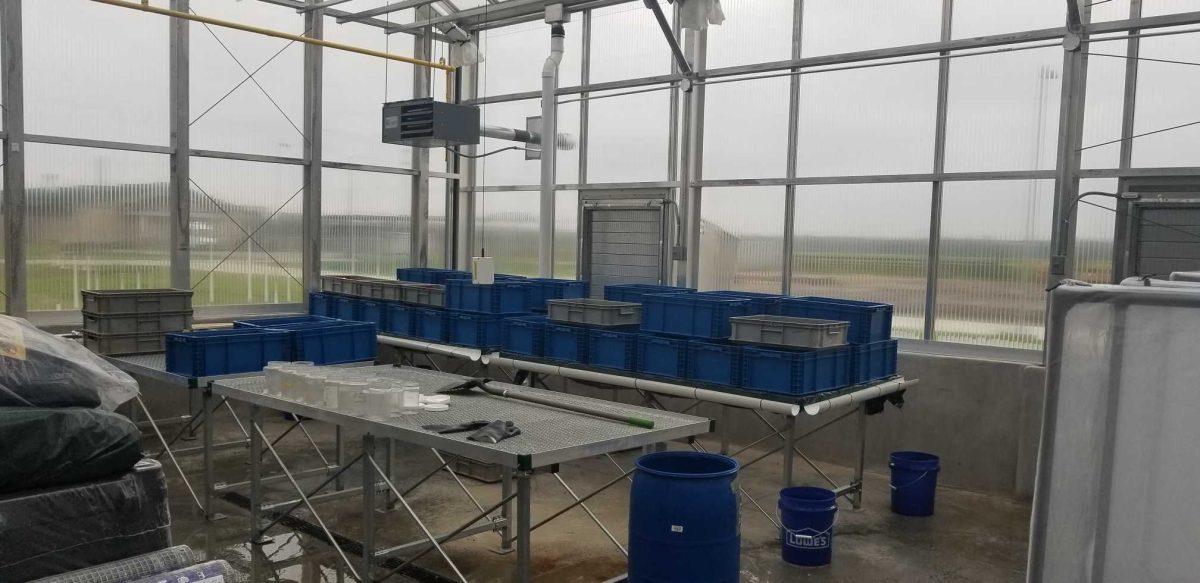LSU Campus Sustainability is partnering with an unusual ally in its quest to reduce campus food waste — the black soldier fly.
Black soldier larvae, indigenous to Central America and the southern U. S., feed on decaying organic material, said Devon Brits, a graduate assistant with LSU Entomology. The University is using these larvae to break down food waste from the dining halls.
“LSU Dining jumped at the opportunity to partner with the University on a program that works toward a common goal of food waste reduction,” said Margot Carroll, assistant vice president of LSU Auxiliary Services, in an email.
The project is in its pilot phase and is currently only being tested with food waste from the 459 Commons, said Sarah Temple, assistant director of Campus Sustainability. But the University plans to expand to all the dining halls within the next six to 12 months.
The project is part of the University’s plan to divert 75 percent of its waste from landfills by the year 2030, Temple said. Currently, the University only diverts an average monthly rate of 42 percent of its waste.
Temple said she came to the University in 2014 looking for a solution to composting post-consumer food waste. The University already brings clean kitchen waste, uneaten food products, to local farms to use as food for livestock through Organix Recycling. In 2018, the University recycled 75 tons of pre-consumer food waste.
But the University didn’t yet have a plan for other food waste until the Entomology Department introduced the black soldier fly process.
“We have been looking for a solution to divert food waste from the landfill for more than four years, since I have been here at LSU,” Temple said in an email. “I was beyond thrilled to find a potential campus-wide solution with the black soldier fly process and to create this partnership with LSU Entomology.
Dining hall food waste is collected in barrels, which Brits takes to the Plant Material Center, also known as The Greenhouses at Ben Hur. There, Brits adds the larvae into the waste. The larvae will eat about 60 percent or more of the waste, turning the remaining material into proteins and fats.
Temple said the process is a fully closed sustainable loop system. Brits turns over the remaining compost, containing rich nutrients like nitrogen, phosphorus and potassium to the LSU Landscape Services to use as fertilizer.
Brits said he also extracts the larvae from the fertilizer and sells them as alternative livestock feeds through Fluker Farms, the company he works for in Port Allen. Using these larvae as livestock feed relieves pressure on the fishing industry, as fish meal used to feed livestock takes up about a third of the fish caught each year, Brits said.
“Everything that comes out of this system is actually being used for a purpose,” Brits said.
Brits said one gram of black soldier fly eggs produces about 40,000 larvae, and he produces about 50 grams of fly eggs a day.
The black soldier fly process has gained traction in the last four to five years, Brits said. Brits has worked in the field for about six years, starting with his undergraduate final project and his graduate thesis in South Africa.
Fluker Farms produces exotic pet foods and is cosponsoring the project at the University. Brits said the company started looking at the black soldier fly because it’s a popular insect to use in insect feed.
LSU receives assistance from an expert at Texas A&M University who studied this process for his PhD in 2001 and now operates a lab at Texas A&M, Brits said.
This initiative is partially funded by the student green fee and serves as an example of all components of University life coming together for a campus-wide goal, Temple said.
“What makes this program so exciting to me is not just the development of a creative solution to address campus food waste, but the opportunity for faculty, staff and students to collaborate to provide answers to others needing to recycle post consumer food,” said Tammy Millican, executive director of Facility and Property Oversight, in an email.











